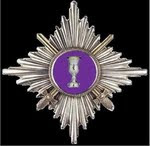
In 1702, the much beloved King of Unkerlant, Karl Franz III died without a legitimate heir. He had outlived not only his wife the Queen, but all five of his sons who had died earlier of childhood disease or riding accidents.
The kingdom was in turmoil. There were four claimants to the throne:
First was Karl Franz’s sister, the Arch-Duchess Brunhilde of Volborg. Older than her brother, Brunhilde was almost worshipped in her home duchy. Her portrait graced every house and hovel, despite the fact the elderly Arch-Duchess had not been seen in public in years. It was whispered (never by Volborgians) she was dead, and that the duchy was actually run by her consort Augustus, a man despised as much as Brunhilde was loved.
Another claimant was the exiled Prince Ruprect of Borogravia. Borogravia, once part of greater Unkerlant, had broken away during the First War of Unkerlant Succession. Prince Ruprct was the son of Karl Franz’s brother Otto, and therefore the king’s nephew. Had not Ruprect been a “foreigner”, he would have been the obvious choice for the throne, despite the fact he tried to have his uncle assassinated on several occasions. This was just considered “politics” by most Unkerlanters.
Next on the list was Prince Adalbert of Franistover, cousin to Karl Franz on his mother's side. The prince was often called Adalbert the “Addle-Brained”. He was a portly man and gregarious by Unkerlantian standards, but prone to often bizarre decisions like knighting his chef after he baked a particularly good pie.
Lastly, Karl Franz did sire a child that lived to adulthood, just not a child with the queen. Before he married Queen Elzbeth, the king fathered a child with the Duchess Friedricha of Zlobenia. The duchess never married, and their son Sigmund took the title of Duke of Zlobenia after her death in 1663. Duke Sigmund “the Bastard”, was an indifferent ruler, usually hunting instead of governing.
Now, throw into this mix that Unkerlantian kings rule by authority of the seven Electors. Whomever could win over these votes would be king (or queen) of Unkerlant. The stage was set for one of the messiest, oddest, and most little known struggle of the 18th century.


















































1 comment:
"The messiest, oddest <> struggle of the 18th century"
Now that's promising!
Post a Comment